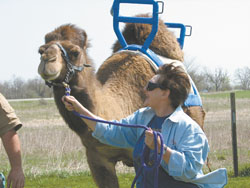
Interested in camels? You can learn everything you ever wanted to know at a clinic organized by Don and Michelle Strobel, Clinton, Mich.
Strobel and his wife breed and sell camels. Breeding camels is something he advises people to do only after they've become very familiar with the unusual animals. Bull camels in rut are not fun to deal with, he warns. After the clinic, he had his vet demonstrate castration on three young bulls. He also showed attendees a bull in rut, breeding a cow.
"We covered a lot of things you couldn't learn anywhere else," says Strobel. "We also covered basic training, like how to get them to lie down, how to get them on and off a trailer, and general behavior issues and problems."
One of the big benefits of attending the camel clinic is exposure of new people in the industry to a number of long time owners.
"If you can't get hold of your vet and it's 10 p.m., but you have a list of contacts you can call for advice, what is that worth?" he asks.
The Strobels raise Dromedary camels, the ones with one hump. Dromedaries have no problem adapting to Michigan weather, Strobel says. He also prefers their personalities, and an adult can carry three riders.
Offering rides at community and corporate events and having a traveling petting zoo are a big part of what Stro-Bull Farms does. However, Christmas nativity scenes are the cash cow for camel owners.
"Three or four nativities a season will pay for your camel," says Strobel.
Price depends on sex, age and training.
"You can charge for a few hours, depending on if you include other animals," he says. "I have friends who charge a fee for just one camel."
Strobel adds that camels, unlike other exotics, have never gone through a boom and bust cycle, but have kept their value year in and year out.
He points out a male will reach 1,800 lbs. or bigger. "For the most part, they are easy keepers, and females and geldings make great pets," he says.
Strobel advises folks interested in buying a camel to attend a clinic first. "I had a young couple who wanted an animal," he says. "I suggested they attend the clinic. It cost them, but at the end they knew they still wanted a camel, and I was comfortable they knew what they were doing."
